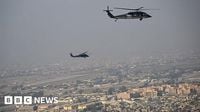Amid escalating tensions with Iran, the United States has initiated a partial evacuation of its embassy in Baghdad and authorized the voluntary departure of military dependents from several Middle Eastern countries, including Bahrain, Kuwait, and the United Arab Emirates. This significant move, announced on June 11, 2025, reflects growing concerns over regional security and the fragile state of nuclear negotiations between Washington and Tehran.
President Donald Trump addressed reporters at the Kennedy Center in Washington, D.C., confirming that U.S. personnel were being moved out of the Middle East because "it could be a dangerous place," adding, "We27ve given notice to move out, and we27ll see what happens." He reiterated a firm stance on Iran's nuclear ambitions, stating, "They can27t have a nuclear weapon, very simple. We27re not going to allow that." This declaration underscores the administration27s unwavering commitment to preventing Iran from developing nuclear weapons, a central issue fueling the current diplomatic and military tensions.
The State Department confirmed the decision to reduce the U.S. mission in Iraq, ordering the departure of nonessential embassy staff in Baghdad. American and Iraqi sources have verified the evacuation, though specific details regarding the security risks or the number of personnel being withdrawn remain undisclosed. An Iraqi official told the Iraqi News Agency that the evacuations are part of broader U.S. diplomatic adjustments across several Middle Eastern countries and that Iraq itself has not recorded any security indicators necessitating such measures.
In parallel, the U.S. Central Command (CENTCOM) announced that Defense Secretary Pete Hegseth authorized the "voluntary departure" of military dependents across the region. CENTCOM emphasized that it is closely monitoring the developing tensions and working with the State Department and allied forces to maintain readiness. Importantly, no active-duty troops have been ordered to evacuate, indicating a strategic recalibration rather than a full military withdrawal.
The backdrop to these developments is a marked deterioration in U.S.-Iran relations, particularly surrounding stalled nuclear negotiations. The next round of talks, tentatively scheduled for June 14-15, 2025, in Oman, faces increasing uncertainty. While U.S. envoy Steve Witkoff remains slated to attend discussions with Iranian Foreign Minister Abbas Araghchi, two U.S. officials have suggested that progress is unlikely. President Trump expressed growing skepticism in a podcast released the same day, admitting he is "less confident" about reaching an agreement that would curb Iran's uranium enrichment activities.
Adding to the volatility, Israeli officials have reportedly prepared for potential military action against Iranian nuclear sites. CBS News reported that Israel is "fully ready" to launch an operation in Iran, a move that could provoke retaliatory attacks on U.S. installations in Iraq. This heightened alert follows months of pressure from Israeli Prime Minister Benjamin Netanyahu, who has urged President Trump to take a more aggressive stance against Iran. Though Trump previously rebuffed plans for an Israeli strike, recent conversations, including a "tense" 40-minute phone call with Netanyahu, suggest the situation remains precarious.
Iranian Defense Minister General Aziz Nasirzadeh issued a stark warning on June 11, 2025, indicating that any conflict would result in significant casualties for the United States. He declared, "America will have to leave the region because all its military bases are within our reach, and we will, without any consideration, target them in the host countries." Tehran's mission to the United Nations echoed this defiance on social media, asserting that "threats of 'overwhelming force' won27t change facts: Iran is not seeking a nuclear weapon, and U.S. militarism only fuels instability."
The United Kingdom's Maritime Trade Operations division also issued a public advisory on June 11, 2025, cautioning commercial vessels navigating the Arabian Gulf, Gulf of Oman, and the Straits of Hormuz to exercise increased vigilance amid the risk of escalating military activity. This warning highlights the broader regional implications of the tension, particularly for critical shipping lanes vital to global energy supplies.
Economic markets responded swiftly to the news. Oil prices surged more than 4% following reports of the U.S. embassy evacuation, with Brent crude futures climbing to $69.18 a barrel. Such fluctuations underscore the potential for regional instability to disrupt global energy markets, especially given the Middle East's role as a major oil-producing area.
U.S. military assets remain robust in the region, with approximately 2,500 troops stationed in Iraq and significant presence across Kuwait, Qatar, Bahrain, and the UAE. The aircraft carrier USS Carl Vinson, carrying over 60 aircraft including F-35 stealth fighters, has been deployed in the Arabian Sea for several weeks, with no current plans to alter its position. Additionally, the U.S. maintains several dozen attack and fighter jets in the Middle East, which played a critical role in defending Israel from Iranian strikes last year.
The International Atomic Energy Agency (IAEA) is also in the spotlight as its board of governors meets in Vienna this week. The U.S., alongside Britain, France, and Germany, has submitted a resolution to censure Iran for advancing its nuclear program and violating commitments under the 2015 nuclear deal. The board is expected to vote on this resolution on June 12, 2025. Such censure could prompt the United Nations Security Council to reinstate stringent economic sanctions on Tehran, a move that Iran's foreign minister, Abbas Araghchi, warned would provoke a strong response.
Despite the grim outlook, diplomatic efforts continue. Witkoff is scheduled to meet with Iranian officials in Muscat, Oman, in an attempt to salvage the nuclear talks. However, with Iran yet to provide a formal response to the U.S. proposal and the escalating rhetoric on both sides, the prospects for a peaceful resolution are increasingly uncertain.
These developments come after a series of high-level meetings, including President Trump's June 8, 2025, session with his national security team at Camp David and his subsequent communications with Israeli leadership. The convergence of diplomatic stalemate, military posturing, and economic repercussions paints a complex and volatile picture for the Middle East and U.S. foreign policy.
As the situation unfolds, the world watches closely whether diplomacy can prevail or if the region will spiral into a deeper conflict with far-reaching consequences.


